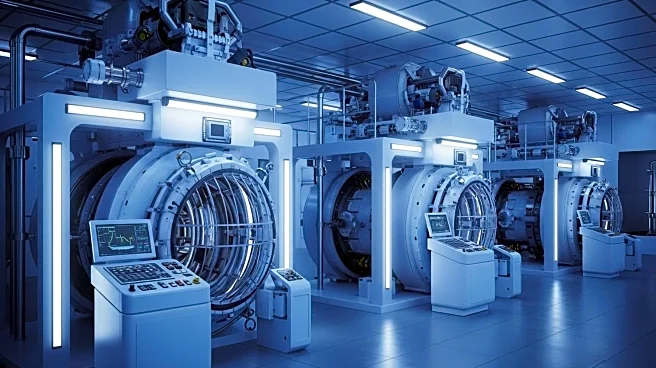What's Happening?
Centrus Energy has signed a Memorandum of Understanding (MOU) with Korea Hydro & Nuclear Power (KHNP) and POSCO International to explore potential investments in expanding Centrus' uranium enrichment plant in Piketon, Ohio. The agreement aims to deepen U.S.-Korea cooperation on civilian nuclear energy and increase the supply volume of enriched uranium. This move reflects strong demand for U.S.-owned uranium enrichment capabilities and seeks to attract private investment to diversify supply and meet Korea's fuel needs. The expansion is contingent upon Centrus receiving federal funding to build new production capacity.
Why It's Important?
The agreement highlights the strategic importance of expanding U.S. uranium enrichment capabilities to compete with foreign enterprises that dominate the market. By securing private investments and federal funding, Centrus aims to restore America's ability to enrich uranium at scale, supporting clean energy and national security goals. This development could enhance U.S. energy independence and create economic opportunities through increased exports to Korea, a major market for enriched uranium. The collaboration also underscores the role of public-private partnerships in advancing nuclear energy technology.
What's Next?
Centrus will continue to seek federal funding from the U.S. Department of Energy to support the expansion of its enrichment capacity. The company plans to match federal funds with private capital and utility purchase commitments. The MOU sets the stage for further cooperation, including additional supply agreements for Low-Enriched Uranium (LEU) and High-Assay, Low-Enriched Uranium (HALEU) for next-generation reactors. As Centrus progresses with its strategic initiatives, it will focus on securing regulatory approvals and attracting qualified employees to support its operations.
Beyond the Headlines
The expansion of uranium enrichment capabilities raises questions about geopolitical implications, particularly in the context of global nuclear energy competition. The collaboration with Korean partners may influence international relations and trade dynamics, as countries seek to secure reliable energy sources. Additionally, the focus on HALEU production reflects a shift towards advanced nuclear technologies that promise greater efficiency and sustainability.












